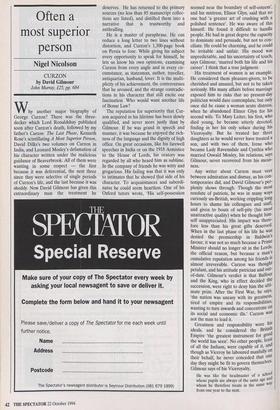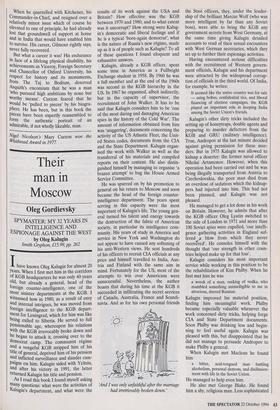Often a most superior person
Nigel Nicolson
CURZON by another major biography of George Curzon? There was the three- decker which Lord Ronaldshay published soon after Curzon's death, followed by my father's Curzon: The Last Phase, Kenneth Rose's scintillating A Most Superior Person, David Dilks's two volumes on Curzon in India, and Leonard Mosley's defamation of his character written under the malicious guidance of Beaverbrook. All of them were wanting in some respect — the first because it was deferential, the next three since they were selective of single periods of Curzon's life, and the last because it was shoddy. Now David Gilmour has given this extraordinary man the treatment he deserves. He has returned to the primary sources (no less than 85 manuscript collec- tions are listed), and distilled them into a narrative that is trustworthy and enthralling.
He is a master of paraphrase. He can reduce a long letter to two lines without distortion, and Curzon's 1,300-page book on Persia to four. While giving his subject every opportunity to speak for himself, he lets us know his own opinions, examining Curzon from every angle and in every cir- cumstance, as statesman, author, traveller, antiquarian, husband, lover. It is the multi- plicity of his achievement, the controversies that he aroused, and the strange contradic- tions in his character that still excite our fascination. Who would want another life of Bonar Law?
The reputation for superiority that Cur- zon acquired in his lifetime has been slowly qualified, and never more justly than by Gilmour. If he was grand in speech and manner, it was because he enjoyed the rich- ness of the language and the dignity of high office. On great occasions, like his farewell speeches in India or on the 1918 Armistice to the House of Lords, his oratory was regarded by all who heard him as sublime. In the company of friends he was witty and gregarious. His failing was that it was only to intimates that he showed that side of his character. To acquaintances and subordi- nates he could seem heartless. One of his Oxford tutors wrote, 'His self-possession seemed near the boundary of self-esteem', and his mistress, Elinor Glyn, said that no one had 'a greater art of crushing with a polished sentence'. He was aware of this himself. He found it difficult to handle people. He had in great degree the capacity to dominate and persuade, but not to con- ciliate. He could be charming, and he could be irritable and unfair. His mood was unpredictable, and his uncertainty of touch, says Gilmour, 'marred both his life and his career'. I think that a true judgment.
His treatment of women is an example. He considered them pleasure-givers, to be cherished and amused, but not to be taken seriously. His many affairs before marriage exposed him to risks that no present-day politician would dare contemplate, but only once did he cause a woman acute distress, when he abandoned Elinor Glyn for his second wife. To Mary Leiter, his first, who died young, he became utterly devoted, finding in her his only solace during his Viceroyalty. But he treated her three daughters as he would never have treated a son, and with two of them, Irene who became Lady Ravensdale and Cynthia who married Oswald Mosley, his relations, says Gilmour, never recovered from his mean- ness.
Any writer about Curzon must veer between admiration and dismay, as his con- temporaries did, and David Gilmour's per- plexity shows through. Though the most resolute of patriots, he was in many ways curiously un-British, working crippling long hours to shame his colleagues and staff, and given to bouts of self-pity (his most unattractive quality) when he thought him- self unappreciated. His impact was there- fore less than his great gifts deserved- When in the last phase of his life he was denied the premiership in Baldwin's favour, it was not so much because a Prime Minister should no longer sit in the Lords, the official reason, but because a man's cumulative reputation among his friends 15 almost irreversible. Curzon was thought petulant, and his attitude patrician and out- of-date. Gilmour's verdict is that Balfour and the King, who in effect decided the succession, were right to deny him the ulti- mate prize. After the First War, he says, `the nation was uneasy with its greatness, tired of empire and its responsibilities, wanting to turn inwards and concentrate on its social and economic ills.' Curzon was not the man to lead it. Greatness and responsibility were his ideals, and he considered the British Empire 'the greatest instrument for good the world has seen'. No other people, least of all the Indians, were capable of it, and though as Viceroy he laboured manfully on their behalf, he never conceded that one day they might be fit to govern themselves. Gilmour says of his Viceroyalty, He was like the headmaster of a school whose pupils are always of the same age and whom he therefore treats in the same way from one year to the next. When he quarrelled with Kitchener, his Commander-in-Chief, and resigned over a relatively minor issue which of course he elevated to one of principle, he had already lost that groundswell of support at home and in India that would have enabled him to survive. His career, Gilmour rightly says, never fully recovered. But what a career it was! His endurance in face of a lifelong physical disability, his achievements as Viceroy, Foreign Secretary and Chancellor of Oxford University, his respect for history and its monuments, from The Taj to Bodium, deserved Asquith's encomium that he was a man who pursued high ambitions by none but worthy means'. Curzon feared that he would be 'pulled to pieces' by his biogra- phers. He has been, but in this book the pieces have been expertly reassembled to form the authentic portrait of an admirable, if not wholly likeable, man.
Nigel Nicolson's Mary Curzon won the Whitbread Award in 1977.











































































 Previous page
Previous page